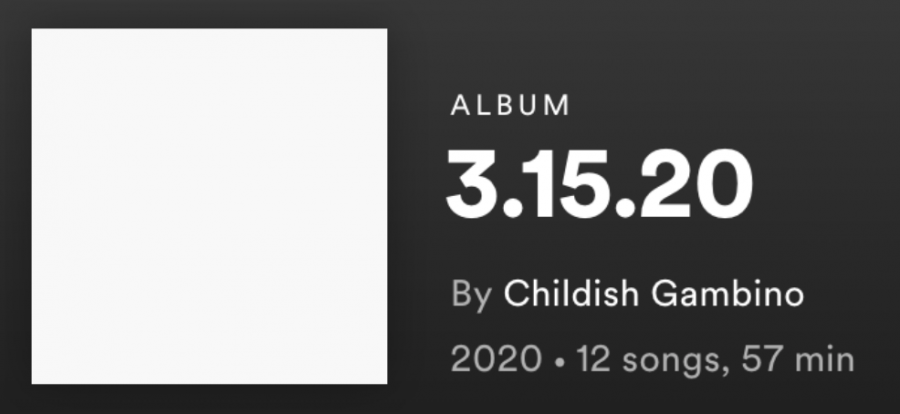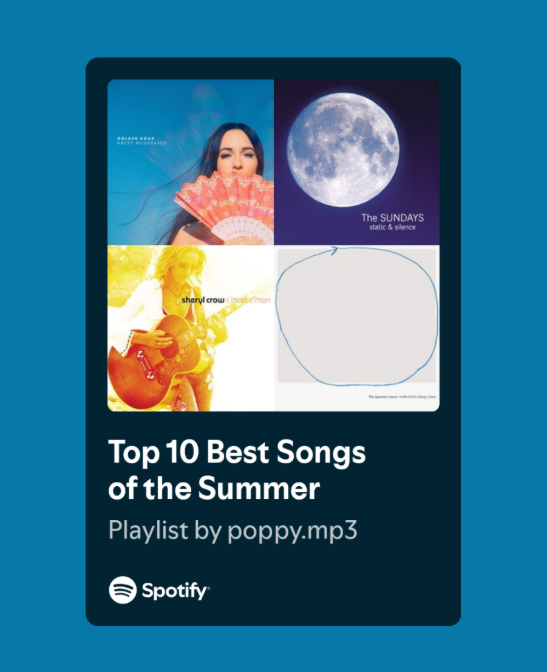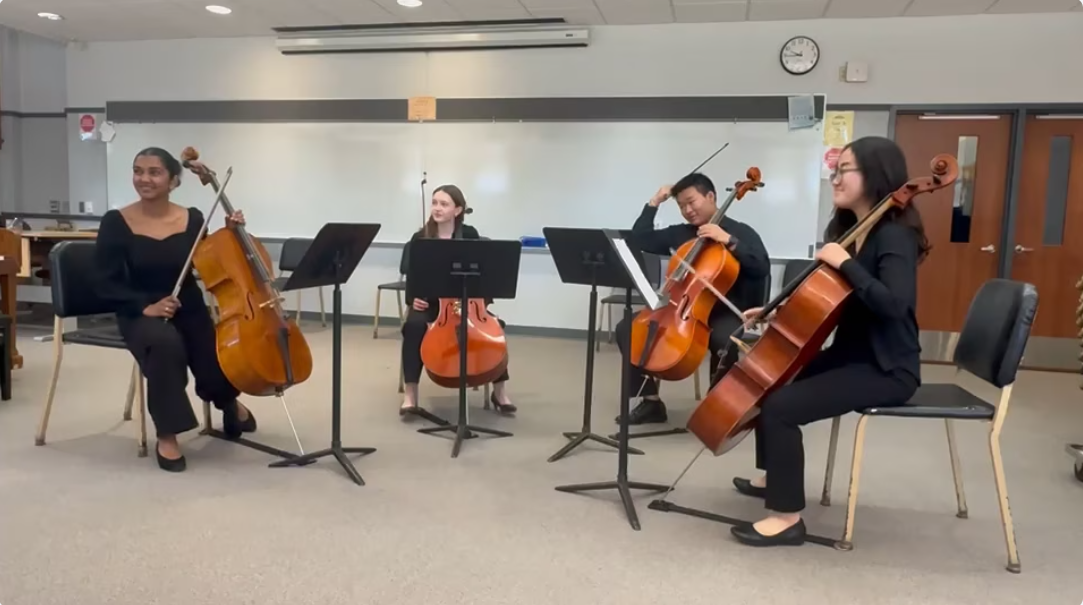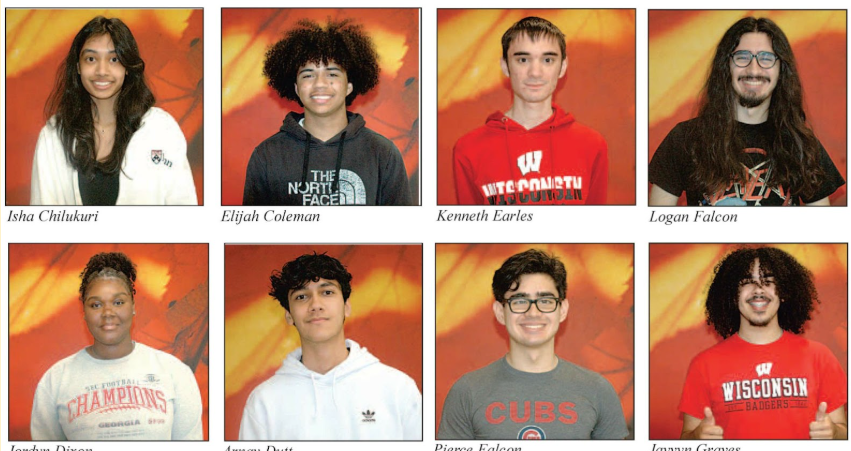Donald Glover Transcends Pop With New Album “3.15.20”
Cover art for 3.15.20 by Childish Gambino via Spotify
Childish Gambino goes post-minimal for the cover of his new album, possibly as an ode to the Beatles’ “White” album.
April 5, 2020
After four years of anticipation from fans, Donald Glover, a.k.a. Childish Gambino has released his fourth studio album “3.15.20” on March 22, 2020. Following his last album “Awaken, My Love” which featured the hit single “Redbone,” Gambino abstracts himself even further from the top 40 pop charts with an amalgamation of Chicago house beats, looping psychedelic tracks, and features from artist like 21 Savage, SZA, Ariana Grande, and his son Legend Glover. So far, the album has received a score of 83 on the popular music review website Metacritic.com, situated in the same caliber as Mac Miller’s “Circles” and The Weekend’s “After Hours.”
From hard-hitting songs like “Bonfire” and “IV Sweatpants” to his more melodic vocals and synth beats on his hit song “3005,” Glover has become the master of multiple genres and styles. However, Gambino seems to have left that production style in his past because this new album is entirely different from what he has previously released. “3.15.20” is a 12 track album that is nearly an hour-long, with over half of the songs being over four minutes in length; it’s evident Glover is not going for radio playtime with this release.
Many fans are thrilled with the release of this new album because of its upbeat and danceable quarantine jams. But this seems like the finale to Donald Glover’s Childish Gambino persona. After Glover won “Best Traditional R&B Performance” for his song “Redbone” in 2018, he revealed to Billboard that he plans to “retire his Childish Gambino persona” with this album (Saponara). Only time will tell if this is the end of music from Donald Glover. Because this may be the end of Childish Gambino music as we know it, I made it my mission to sit down with this new album and to break it down track by track.
0.00
This opening track establishes the entire tone for what is about to come. It’s a reverberated and icy distorted vocal of Glover repeating “We are” over a pulsing synth keyboard and minimal piano. An opening track can either entice someone into listening to more or have them altogether ditch an album, and Glover left me split down the middle. Many fans have agreed that you need to have been a longtime Childish Gambino fan to understand and enjoy a handful of songs on the album, and this is one of them. Without having a listening history with Glover’s music, many listeners may become bored with such a simple track and be deterred from finishing the album. However, longtime followers of Glover know that this track is just the blueprint from where Glover will expand into fully flush instrumentation.
Algorithm
Right from the get-go, this song features heavy Chicago house beats in the verses that fade into more subtle instrumentals in the chorus. The verses of this song carry themes of dystopia, religion, and human vulnerability in contrast to artificial intelligence. The verses are delivered with Glover using a voice distortion device to make him sound robotic. Conversely, the chorus focuses on staying alive in a society full of the themes previously mentioned. This track gets you up and dancing (literally because it tells you to “Move and groove to the algorithm”) while also wanting to destroy oppressive institutions in society.
Time (feat. Ariana Grande)
“Time” focuses on the world and the people who inhabit it. Grande and Glover sing back and forth about existential time and the inevitability of the end of the world. “Time” is more melodic than previous tracks, as it features airy synths, bouncy bass, and electrifying guitar. Midway through the song, a chorus joins Glover, giving it almost a gospel vibe. At this point, the tone shifts from living in the moment to focusing on the concept of time. The lines “Dancing with no pain, we wait to see the sunrise, it’s a holiday (Hey)” encapsulate a feeling of freedom and limitless existence beyond the fear of tomorrow’s pain. “Time” finds the perfect juxtaposition of sci-fi dystopia and carefree life.
12.38 (feat. 21 Savage and SZA)
On “12.38,” Glover details a sexual relationship with a woman. This song is purely R&B in comparison to what we’ve heard so far, and it’s packed with sexual innuendos as he describes the experiences he’s had with this mystery woman. However, infidelity creeps its way into the song as another girl is described as “going crazy on [his] Motorola.” He has to part ways with the woman, although he still has feelings for her. After a short instrumental interlude, 21 Savage drops in with his feature, talking about his rags to riches story. He raps about relationships with his Harvard girlfriend, and how women and men can both be involved in infidelity. The song finishes by repeating the phrase “Baby, let’s take it back to the crib” similar to the opening track “0.00”. In its entirety, “12.38” is a song detailing the highs and lows of an intimate relationship and how lovers can transform the personalities of their partners.
19.10
Glover remembers advice from his father that he received during his childhood and how it influences his life now. The production on this song is more simple with hard-hitting bass and drums played in the backing track. Throughout the song, he explains what it means to be beautiful and to have control over your life, repeating, “To be beautiful is to be hunted.” Beauty is scouted out in this world; everyone is trying to find that “thing” that will give them joy. This song is considerably the antithesis to “Algorithm.” Most of “19.10” is just a repeated chorus and a groovy guitar solo, making it an easier listen that doesn’t take too much attention to understand.
24.19
Yet again, we get a groovy melody from Glover, but the lyrics contrast the happy instrumental as he wonders why someone could love him. In the second verse, Glover expands on these ideas, saying, “I always make you cry, no matter how I try, sometimes I wonder why, why would you ever want to love me?” Glover could be talking about his partner from the song “12.38” because she’s his “Sweet thang,” but he advises her not to “Go through my phone,” a theme of infidelity carried from “12.38.” Eventually, he thanks her, telling his lover, “Thank you for showing me, what love can be (I love you)” as an ethereal harp and church organ backs his confession. The vocals in this song are very reminiscent of Prince’s single “When Doves Cry” with Glover showing off his high-pitched growling vocals.
33.22
This song is pure distortion and screaming. If Kanye West’s “I Am A God” from his 2013 release, “Yeezus” had been chopped and screwed (when a song – usually hip hop – has been remixed or “chopped” by a producer to achieve a new sound) this would be it. This song will make your anxiety peak, and that is exactly what Glover seems to want. Creating feelings of anxiety and chaos to parallel the development of the lyrics that are almost post-verbal, he achieves this shift. It’s incredibly difficult to follow lyrically because all the vocals are so blown out, which could mirror how difficult it is to follow one’s thoughts during a time of high stress and confusion. This song is pure chaos.
35.31
This is the epitome of a Southern square dancing song. Glover tells the listener how to dance along in the chorus, then continues to talk about a love interest (possibly the girl from “12.38”) and his life in the verses. As much as he seems to be conflicted, this song still shows that Glover can have fun in the darkest of times. The rhythm is infectious even as the song’s beat switches from country to urban. It still has the same rhythm and energy that makes you want to dance along.
39.28
In this song, Glover wonders why he should even go to the party if the woman he likes isn’t there. Yet again, the themes of love and devotion to an unavailable woman come into play as he wonders when he’ll “feel her smile” again. The vocals in this song sound like they were recorded backward then reversed. It seems like normal singing, but something is just off because when Glover sings, it doesn’t sound remotely human. Most of the instrumentals are just piano and more layered harmonies.
42.26 a.k.a. Feels Like Summer
This is the song of the summer. Earlier in 2018, Childish Gambino released a video “Feels Like Summer,” garnering 171 million views as of this article’s publication. The video for this song featured many celebrities including Beyonce, Kanye West, Michelle Obama, and Nicki Minaj. As soon as this song came on, I recognized it, although it’s under a new name. “Feels Like Summer” is an unforgettable song with a groove to spare. The song has exceptional replay value and leaves me wanting more every time I listen to it. With addictive drum beats, airy flute, and falsetto vocals provided by Gambino, it is the perfect song for summer 2020.
47.48 (feat. Legend Glover)
“47.48” shifts the album back to an R&B vibe with a hearty bass guitar, distorted drums, and electronic piano. This song focuses on elements of police brutality experienced by African-Americans. The chorus repeats “the violence” while telling listeners not to worry about tomorrow and live in today. The song is smooth and melodic and even features a spoken word between Donald Glover and his son Legend Glover. The innocence and happiness of Legend Glover is something to be admired, and this song will bring a tear to your eye.
53.49
Glover takes a victory lap with his last song on the album (almost sounding like Kendrick Lamar in his “Good Kid m.A.A.d City” album). This song is full of beat switches between verse and chorus and proudly preaches self-love. Glover reminds the listener that there’s love everywhere and in everything. If anything, this is a perfect way to wrap up the Childish Gambino story. Glover has run the full track of hip hop, evolving from traditional rap structure in his lyrics and production to incredibly abstract construction, and back again. This song helps create an auditory loop in his discography. If you were to finish with this song and go back to his 2011 album “Camp,” it would be like you started right where you finished. Few artists have the attention to detail and holistic approach that Glover possesses from start to finish in their music.
Only time will tell what Donald Glover’s next move in the music industry is, but if he decides to retire, this is, without a doubt, the best album to do it with. “3.15.20” has proven that Glover refuses to stay in one lane with his music, and has always been a pioneer in experimentation and genre-blending. Glover has been and continues to be a blueprint in the field of experimental rap and hip hop. His absence in the rap scene will definitely leave a spot to fill, and there doesn’t seem to be anyone who can quite replicate or evolve from the classic Childish Gambino sound.















